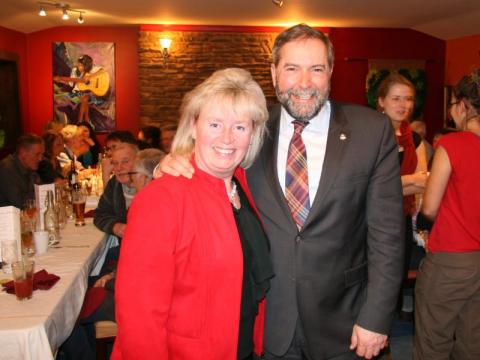
Speaking to Yukon business leaders Wednesday, federal NDP Leader Thomas Mulcair provided a vision of Canada where regulations are clear and consistent.
He also portrayed a country where the federal government and First Nations work together and everyone – including large corporations – pay their fair share of taxes.
Mulcair addressed members of the Yukon and Whitehorse chambers of commerce during a luncheon in the Town Hall room of the Gold Rush Inn.
The NDP leader wrapped up his four-day visit to Whitehorse today following public presentations, media interviews and tours of businesses and institutions.
He kicked off Wednesday’s lunch time presentation by sharing his family connection to the territory, noting his grandparents were married here in 1901. A photo of them graces the Centre de la Francophonie.
Mulcair’s last trip to the Yukon was two years ago, just prior to becoming leader of the party and the Official opposition.
Having been here in 2012 on a whirlwind tour, he said he knew this time he didn’t want the Yukon to be a quick stop. Rather, he wanted to take the time to stay and listen to the concerns of Yukon people.
He highlighted meetings with First Nations, organized labour, businesses and many others.
His speech focused largely on a number of themes he highlighted in an earlier interview with the Star shortly after he arrived in the territory.
An NDP government, which Mulcair spoke repeatedly of forming in the 2015 election, would take a sustainable approach to development looking at the social, economical and environmental impacts.
“This isn’t 1948,” he said.
The environmental impacts from practices of 50 years ago at facilities like the Faro mine can be forgiven, he argued, but with the knowledge available today, there’s no reason for practices to be done that way anymore.
The NDP, he stressed, wants development to succeed.
Prime Minister Stephen Harper’s government has taken an approach that makes it easier for development to simply happen by cutting regulations, he said, having “gutted the Fisheries Act,” for example.
Mulcair argued businesses know environmental assessments are needed to ensure things are done properly.
During a question and answer period after his speech, Mulcair said an NDP government would attend the UN conference on climate change.
Being the only nation to withdraw from the Kyoto Accord is hurting the country, he said as he went on to note the benefits of a cap and trade system in dealing with greenhouse gas emissions.
Mulcair also noted during his speech that if First Nations’ rights aren’t respected, more court battles will happen down the road.
Mulcair went on to point to issues around low voter turnout among young adults, issues with the types of jobs available to Canadians and the lack of taxes being paid by large corporations.
“Every Canadian pays their fair share except Canada’s largest corporations,” he said.
The 59-year-old Quebec MP went on to note problems of young kids and seniors living in poverty, inequality in education for First Nations and a desire to see stricter enforcement of gas prices by the competition bureau.
He also stressed the importance of recognizing regional issues, including looking at the rate of inflation in the North, rather than the South, when factoring it into the northern tax credit.
“That’s where we come in,” he said.
The NDP will look at how achievements like universal medical care have come about in the past.
Answering audience questions, Mulcair continued to stress the need for a credible and accountable federal government.
The NDP has a history of proven leaders and the most consistent balanced budget of any party, he said, naming the likes of Jack Layton, Tommy Douglas and former Yukon MP Audrey McLaughlin.
While Mulcair would not commit to going to a system of proportional representation nor a format similar to that, he did note, “We’re consulting on it.”
Such a change, he said, would require broad social adhesion.
He was clear that the NDP wants the Senate gone.
Getting rid of the Red Chamber is something that’s been on the NDP’s books since the 1960s, he said, though it wasn’t something he had thought a lot about until a bill put forward by Layton was blocked by the Senate a few years ago.
The Senate, Mulcair said, is not something that’s adapted to today’s reality.
He also highlighted Harper’s record of transforming defeated Conservative candidates into senators after stating his government’s desire to abolish the upper house.
Speaking to reporters following the presentation, Mulcair commented on the resignation of Trinity-Spadina (Ont.) NDP MP Olivia Chow earlier in the day.
Chow – Layton’s widow – gave up her seat to seek the mayoralty in Toronto.
Mulcair admitted he has “mixed emotions” about the resignation.
A loss to the NDP in Ottawa is Toronto’s gain, he said as he recalled the many issues Chow had worked on as an MP.
Questioned about what kind of impact Chow’s decision to leave Ottawa might have on the NDP in the pending federal election, Mulcair replied that “frankly,” having a former NDP MP become Toronto’s mayor would be a positive for the party in 2015.
By Stephanie Waddell – Whitehorse Star
